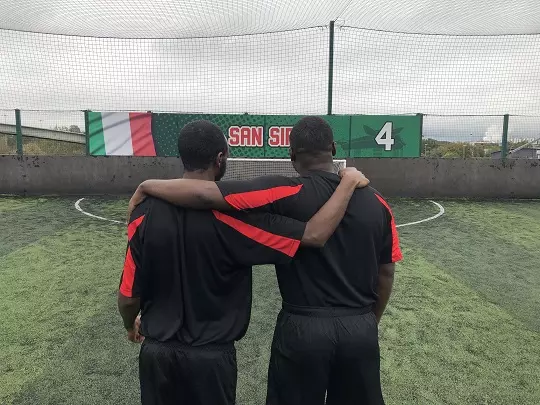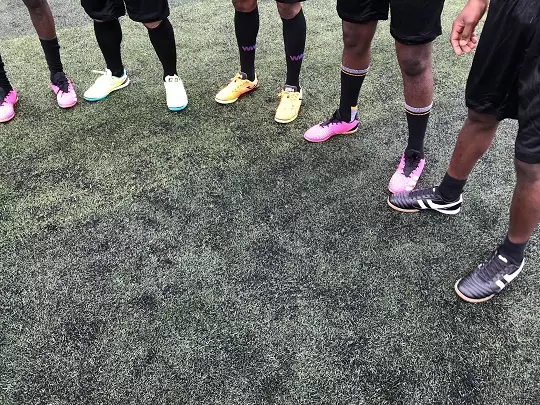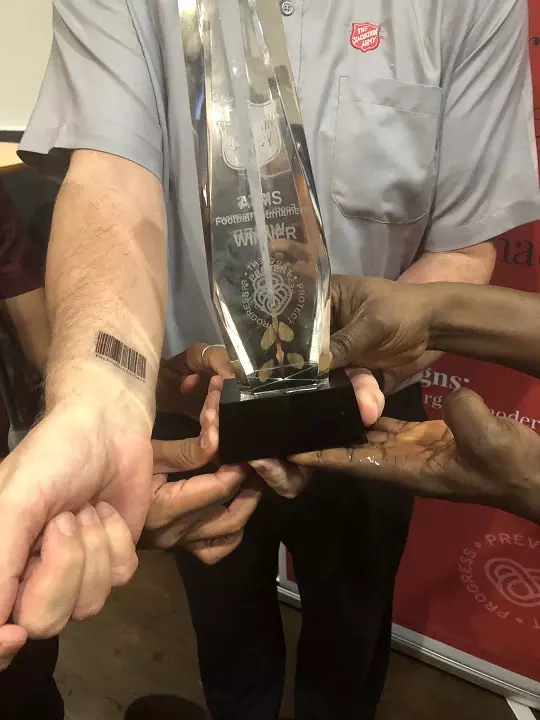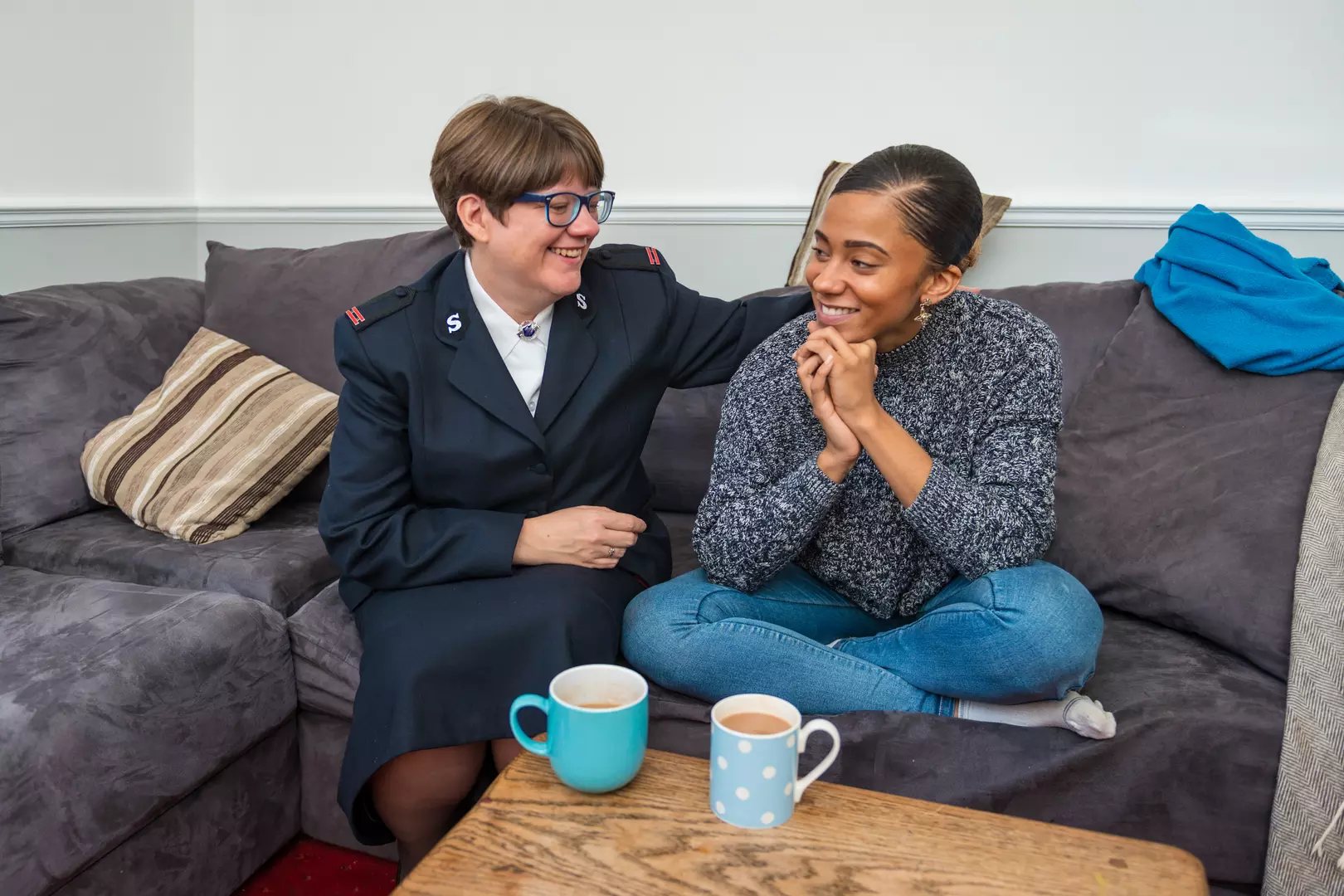First football tournament for survivors of modern slavery
published on 24 Oct 2023
The first-ever football tournament for survivors of human trafficking and modern slavery was held in Birmingham's Goals, in Star City on Friday 20 October.
The event gathered 11 teams together from safe houses and outreach services run by The Salvation Army and its partners across England and Wales.
The Anti-Slavery Football tournament was devised by The Salvation Army to celebrate the achievements of survivors both on and off the pitch and how far they have come as they move on from horrific and traumatic experiences of exploitation. Taking part in team sports can play an important part in the long journey to recovery and healing by improving physical and mental health and developing new skills.
The tournament coincided with release of new figures which show an increase in survivors of modern slavery who are rescued and offered support by The Salvation Army through the Government’s Modern Slavery Victim Care Contract.

The Salvation Army’s annual report on the specialist support it provides to adult survivors of modern slavery in England and Wales found between July 2022 and June 2023:
- In the West Midlands region, 284 people had been rescued from modern slavery and referred to The Salvation Army between, a seven percent increase on the previous year*.
- Overall in England and Wales 3,533 people were rescued and offered support which is a 5% rise on the previous year.
Many of these people had been forced to commit crimes, work against their will, or coerced into sex work. Over the last 12 years, The Salvation Army’s and its partners’ specialist support workers have helped 21,824 survivors get medical care, counselling and legal advice and a safe place to stay where needed. However it estimates that for every person rescued and offered support at least seven more remain trapped*.
Marilyn said: “Today has been a beautiful day for me. I used to play football in school and university and I haven’t played for over two years. It has inspired me to get into football and sports again.”
Dan said: “I came today not expecting to play, but our team was short, so I played in goal. It’s made me want to take up sports again; my sons would be proud of me to know I’ve done this.”
The tournament took place on a wet and windy day at Star City, but it didn’t dampen the spirits of the players, with all teams travelling from different parts of England and Wales. The winning team was from survivors supported by The Salvation Army’s partner, Hestia, in London.

Major Kathy Betteridge, The Salvation Army’s Director of Anti-Trafficking and Modern Slavery, said:
“Today’s event shows the importance of sport in helping people build physical and mental resilience and a strong sense of community as they rebuild their lives. We’re so pleased to be able to provide this extra opportunity for the survivors we and our partners support and to mark Anti-Slavery Day by celebrating their achievements.”
“We are deeply concerned by the alarming increase in people trapped in modern slavery in every region across England and Wales. Modern slavery tends to be hidden in plain sight and we are continuing to see there is no limit to the imagination of a trafficker when it comes to people being bought and sold for their own gain.
“Anyone can help The Salvation Army and the police fight modern slavery by raising the alarm if you are worried someone is being exploited. We all have a part to play and together we can be a voice for the voiceless. Please learn how you can spot the signs and where to report your concerns.”

Franck*1, from Central Africa, a player in the tournament, spoke about his experiences:
“Back home I had been given a lot of promises of a job with good pay in the UK. I was happy. Then the British lady, who was my manager and had organised everything for me, including picking me up at the airport, took my passport, which was strange. I arrived in London and was told I would be working there, but I soon suspected we were travelling away from the city, I did not know the UK at all, so couldn’t work out what was happening. I was taken to a six-room house with more than 25 people living there, there was always people in the bathroom and queuing to use the kitchen. I worked from 6am until 10pm with no break and then, at the end of the month I hardly got any pay. I worked there for six months.
“Everything was a challenge. My physical and mental health became bad. I was told if I didn’t do everything they said she would send me back home. I knew no-one here. I was afraid. Eventually, the day the police came she wasn’t at the house, so I could speak to them. The police told me The Salvation Army were going to look after me. When I arrived with them, that was the beginning of my dream. Where I was before, they were shouting and screaming at me and threatening me. But when I came to The Salvation Army, they spoke to me softly and asked me what kind of support did I need and I thought, ‘Am I dreaming?’ And from that day I was given everything I need from The Salvation Army.”
The Salvation Army’s free confidential 24/7 referral helpline 0800 808 3733 is available for anyone who suspects they or someone they have met may be a victim of modern slavery and needs help. Members of the public can learn to spot the signs here.
*It is estimated that there are 122,000 people in the UK living in modern slavery [1], that is 1.8 individuals per 1000 people. In 2022, a combined total of 14,895 positive reasonable grounds decisions were given by the Immigration Enforcement Competent Authority (IECA) and Single Competent Authority (SCA).[2] Therefore, for every survivor given the opportunity to enter support, there are at least seven people still living in modern slavery.
[1] Source: World | The Global Slavery Index (walkfree.org)
[2] Source: NRM (National Referral Mechanism): Modern Slavery: National Referral Mechanism and Duty to Notify statistics UK, end of year summary 2022 - GOV.UK (www.gov.uk)
The Salvation Army annual reports can be found here.
*1 Name changed to protect identity
The Salvation Army was appointed in 2020 to the Government’s new Modern Slavery Victim Care Contract to manage the support of adult victims of modern slavery in England and Wales.
